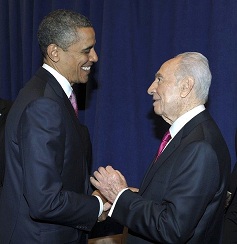Please Stop: Your 'Deep Concern' has Gotten us Nowhere
We know for a fact that US President Barack Obama can utter extremely strong words. We know it because he heard him yesterday being as assertive and as firm as any leader can possibly be. Practically groveling for Jewish votes, Obama put on his “I heart Israel” face and let out all the stops.
“…when one-sided resolutions are brought up at the Human Rights Council, we oppose them. When there are efforts to boycott or divest from Israel, we will stand against them. And whenever an effort is made to delegitimize the state of Israel, my administration has opposed them. So there should not be a shred of doubt by now - when the chips are down, I have Israel’s back.” You sure do, Mr. Obama. Without a doubt.
So,anyone can understand why we Palestinians just don’t want to hear it when Obama or any of his mouthpieces in the government express their “deep concern” for Israel’s gross violations against the Palestinians. It is not even “concern” in most cases but a nonchalance at best. When in December 2011, 14 Security Council members including some of the United States’ closest allies issued a statement condemning Israel’s continued settlement construction and settler violence, the US bailed. "We declined to join that statement for all of the usual reasons. It doesn’t change the fact that our longstanding policy remains that we don’t recognize the legitimacy of the continued Israeli settlements, but we don’t think statements in the UNSC are the way to pursue the goal of getting these parties back to the table," State Department Spokesperson Victoria Nuland said.
And when 930 settlement units were approved for construction in the East Jerusalem settlement of HarHoma, the US said it was “deeply concerned” at the unilateral move. It did not however, put its concern into concrete steps to counter it.
While Europe is also in love with the term “concerned” when it comes to Israel and its measures against the Palestinians, its tone is not nearly as condescending as the Americans. Listening to Obama yesterday speaking before AIPAC, it was very hard not to turn the television (or computer) off.



























